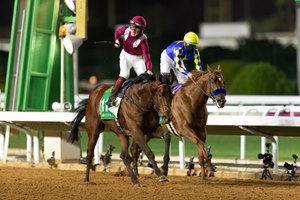Saudi Cup Elevated to Group 1 Status


The organization responsible for managing the graded/group status of internationally recognized races promoted Saudi Arabia to Part II status and made the Saudi Cup a group 1 race, according to an announcement from the International Federation of Horseracing Authorities.
The International Grading and Race Planning Advisory Committee's changes were shared during an Oct. 4 meeting of the IFHA executive council meeting.
While the group status of races under Part II rules are considered "for information only" and not recognized internationally, specific races can be elevated to Part I status and earn international recognition. Such was the case with the $20 million Saudi Cup, which had its inaugural running in 2020, and now will carry group 1 status for its running next year Feb. 26 at King Abdulaziz Racetrack. The 1,800-meter (1 1/8-mile) race was first won by Maximum Security and won earlier this year by Mishriff .
Other races on the Saudi Cup undercard were elevated to group 3 status, too: the $1 million Neom Turf Cup, a 2,100-meter (about 1 5/16-mile) race on turf; the $1 million 1351 Turf Sprint Sponsored by STC, a 1,351-meter (nearly seven-furlong) turf race; the $1.5 million Saudi Derby Sponsored by Al Rajhi Bank, a 1,600-meter (one-mile) dirt race; the $1.5 million Riyadh Dirt Sprint Sponsored by Saudi Arabian Airlines at 1,200 meters (six furlongs); and, the $2.5 million Red Sea Turf at 3,000 meters (1 7/8 miles) on turf.
The IRPAC also promoted Bahrain to Part II status, which means its Al Methaq Cup, His Majesty the King's Cup, and His Royal Crown Prince Cup will be recognized internationally as black-type stakes. The country's Bahrain International Trophy (G3) also was elevated to internationally recognized group 3 status.
The IFHA meeting was led by its new chair Winfried Engelbrecht-Bresges, who succeeded Louis Romanet. Romanet had served as the federation's chair since its founding in 1994 and now serves as chairman emeritus. The meeting also marked the commencement of three-year terms for Jim Gagliano, Brian Kavanagh, Masayuki Goto, and Horacio Esposito as vice-chairs.
Other business conducted by the executive council included:
- Approving executive council appointments for Bruce Sherwin, director of New Zealand Thoroughbred Racing, and Dr. Paull Khan, secretary-general of the European and Mediterranean Horseracing Federation, as rotating members representing "developing racing countries."
- Endorsed the chair and nominations to its Finance Committee—Jim Lawson with Woodbine is the chair, and committee members include Oscar Bertoletti, CEO of Organización Sudamericana de Fomento; Olivier Delloye, CEO of France Galop; Suzanne Eade, chief executive for Horse Racing Ireland; and Greg Nichols, director of racing Australia
- A Governance Committee will be chaired by Julie Harrington, British Horseracing Authority chief executive and committee members announced later,
- Delloye will chair a new Commercial and Marketing Committee, with its committee members to be named later, and
- Andrew Harding will continue as executive director for the IFHA executive office and will be joined by directors Andrew Chesser, manager of registration services for The Jockey Club (USA) and previously secretary general for the IFHA; James Ogilvy, executive manager, international and racing regulation at The Hong Kong Jockey Club and previously technical adviser for the IFHA; and Henri Pouret, managing director, racing operations for France Galop.
